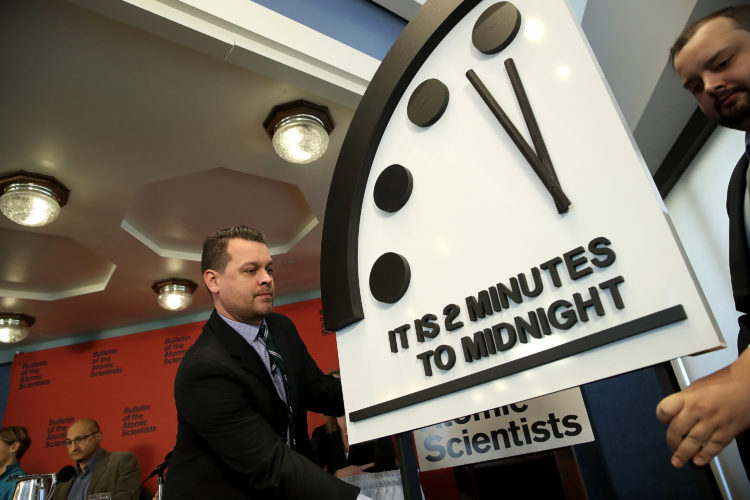The good news should be that the Bulletin of the Atomic Scientists left the Doomsday Clock, a measure of the imminence of nuclear annihilation and climate disaster, unchanged at two minutes to nuclear midnight. This announcement was on Thursday at a news conference in Washington, D.C.
But members of the Bulletin’s executive board insisted that no news was, in fact, bad news.
Citing U.S. relations with North Korea as “extremely dangerous” and with Russia as “unacceptably strained,” chairman and CEO Rachel Bronson decried “the new abnormal that the world inhabits,” a world where reliance on nuclear weapons has replaced diplomacy.
The unchanged time of the Doomsday Clock, she added, “should not be taken as a sign of stability.”
Instead, she said, the Bulletin’s 2019 report finds “the new abnormal that the world inhabits is unsustainable and too volatile to accept.”
The Doomsday Clock project, originating in 1947, “is a design that warns the public about how close we are to destroying our world with dangerous technologies of our own making. It is a metaphor, a reminder of the perils we must address if we are to survive on the planet,” according to its site. Initiated during the threat of nuclear war, it factored in climate change in 2007, and strongly emphasized in this recent report that a failure to reduce emissions into the atmosphere only worsens the potential for flooding and wildfires. The project also considers cyber-warfare a risk.
The clock is now unchanged after moving 30 seconds closer to midnight each of the last two years.
First, the nuclear front. “The nuclear dangers are not because we expect an attack from Russia, but that we will blunder into a nuclear war,” said former Secretary of Defense William J. Perry, citing the possibility of regional nuclear wars between Pakistan and India and on the Korean peninsula and the potential for nuclear terrorism.
Then, climate concerns. Susan Solomon, an environmental studies professor at the Massachusetts Institute of Technology, issued dire warnings about climate change and its impact on the planet. Greenland, she said, is seeing its ice melt “at an unprecedented rate” and that 2018 will likely be declared the fourth warmest year on Earth since record-keeping began. The World Meteorological Organization confirmed this in November, 2018.
“If we don’t start reducing emissions in the next decade, it’s pretty clear we’ll have a world we don’t want to live in,” Solomon said.
Between climate change and nuclear proliferation, Bulletin Executive Chair Jerry Brown––a four-time governor of California––laid much of the blame on “the blindness and stupidity of politicians.” He also made it clear that pressure from the public for action is notably lacking, and warned against complacency in the world “of the new abnormal.” Said Brown: “We’re almost like travelers on the Titanic, not seeing the iceberg but enjoying the dining and dancing. It’s hard to feel a sense of the danger we’re in. It’s late, and it’s getting later.”
The Doomsday Clock remains unchanged at two minutes to midnight.
Already have an account? Sign In
Two ways to continue to read this article.
Subscribe
$1.99
every 4 weeks
- Unlimited access to all articles
- Support independent journalism
- Ad-free reading experience
Subscribe Now
Recurring Monthly. Cancel Anytime.











COMMENTS